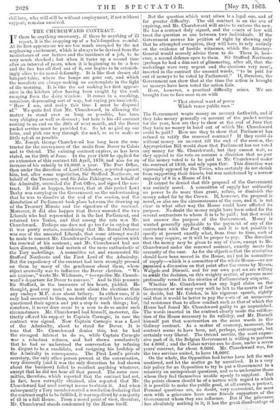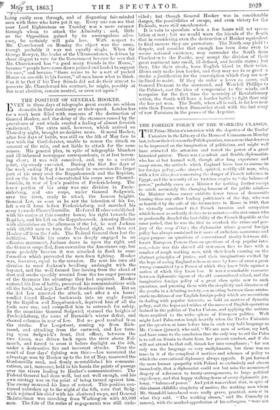THE CHURCII1VARD CONTRACT.
IF there be anything unsavoury, if there be anything of ill 1 report, it is the cropping up of a half-forgotten scandal.
At its first appearance we are too much occupied by the not unpleasing excitement, which is always to be derived from the misfortunes of our betters and the incidents of a job, to be very much shocked ; but when it turns up a second time after an interval of years, when it is beginning to be a bore and the fun has all died out of it, one begins to be astonish- ingly alive to its moral deformity. It is like that dreary old banquet-table, where the lamps are gone out, and which the moralists arc always making us contemplate in the light of the morning. It is like the cat making her first appear- ance in the kitchen after having been caught by the cook escaping fro:n the dairy window. It conies in a sneaking, conscious, deprecating sort of way, but saying perziaaelously, " Here I am, and realy this time I must be disposed of." We quite feel that Mr. Churchward, in allowing the matter to stand over as long as possible, has been very ohliging as well as discreet ; but here is his old contract coming to art end on the 20th of next month, and the Dover packet service must be provided for. So let us gird up our loins, and pick our way through the mu I, so as to make as little splash as possible.
Mr. Joseph George Churchword has long been the con- tractor for the conveyance of the mails front Dover to Calais and to Ostend. The existing contract expires, as has been stated, on the 20th of June. In the year 1859 he applied for an extension of this contract till April, 1870, and also for an increase of his subsidy to 18,000/. a year. The Post Office, then under the direction of Lord Colchester, _reported against him, but, after some negotiation, Sir Stafford Northcote, on behalf of the Treasury, and Sir John Pakington, on behalf of the Admiralty, overruled the Post Office, and signed the con- tract. It did so happen, however, that at this period Lon] Derby was carrying on the Government on the understanding that he was to dissolve at the end of the session, and the dissolution of Parliament took place between the drawing up of the Treasury Minute and the signature of the contract. Moreover, it did also happen that Dover unseated the two Liberals who had represented it in the last Parliament, and returned two Tories, and that among the rats was Mr. Churchward. Perhaps one does not ga too far in saying that it was pretty certain, considering that Mr. Bernal Osborne was one of the unseated Liberals, that some attempt would be made to connect Mr. Churchward's change of opinion with the renewal of his contract; and Mr. Churchward had not been discreet, neither had certain of the more enthusiastic of the Tory underlings. A committee sat, and exonerated Sir Stafford Northcote and the First Lord of the Admiralty. But the expediency of the contract had been strongly pressed on them by many of the gentlemen about them, whose object avowedly was to influence the Dover election. "We are anxious," wrote Mr. Whitmore, "to expedite Mr. Church- ward's departure for Dover to canvass." And to this pressure Sir Stafford, in the innocence of his heart, yielded. He thought, good easy man ! no more about the elections than any embryo M.P. does about bribery. In either case, if it only had occurred to them, no doubt they would have strictly questioned their agents and put a stop to such things; but, somehow, it never does occur to a man to do so under such circumstances. Mr. Churchward had himself; moreover, dis- tinctly offered his support to Captain Carnegie, in case the contract was signed. Now Captain Carnegie was a Lord of the Admiralty, about to stand for Dover. It is true that Mr. Churchward denies this, but he had the strongest interest to do so, while Captain Carnegie was a reluctant witness, and had shown conclusively that he had so understood the conversation by refusing in disgust to be a candidate, and resigning his lordship of the Admiralty in consequence. The First Lord's private secretary, the only other person present at the conversation, very discreetly (and it was the only discretion he had shown about the business) failed to recollect anything whatever, except that he did not hear all that passed. The same com- mittee, therefore, which reported that the contract had not, in fact, been corruptly obtained, also reported that Mr. Churchward had used corrupt means to obtain it. And when subsequently a Tory member moved a resolution declaring that the contract ought to be fulfilled, it was negatived by a majority of 45 in a full House. From a moral point of view, therefore, Mr. Churchward stands condemned by the House itself.
But the question which next arises is a legal one, and of • far greater difficulty. The old contract is on the eve of
lexpiring, and Mr. Churchward will strive to enforce the new.. , He has a contract duly signed, and the courts of law will treat the question as one between two individuals. If the Government answer his petition of right by showing only- that he attempted corruption, they will have to rely entirely on the evidence of hostile witnesses, which the Attorney- General would scarcely advise them to do. There is, how- ever, a second defence open to them. Sir Stafford Northcote- (perhaps he had a dim sort of glimmering, after all, that the- underlings were very urgent and the elections very near),. inserted in the contract the unusual words, "to be paid for out of moneys to be voted by Parliament." if, therefore, the- Government can show that at the time the action is brought. no moneys have been voted the action fails.
Here, however, a practical difficulty arises. We are- brought face to face once mare with "That eternal want of pence Which vexes public men."
The Government wants money on account forthwith, and it they take money generally on account of the packet service- for the year, how are they to show at the end of June that they have no money in hand out of which Mr. Churchward
could be paid? How are they to show that Parliament has refused to ratify the renewed contract? If they could do- without money on account till the end of the session, the.
Appropriation Bill would show that Parliament has not voted any money for Mr. Churchward; but they cannot wait, so- they append to the vote on account a direction that no part of the money voted is to be paid to Mr. Churchward under the contract of 1859, and rely upon that. This direction was- vigoronsly opposed by the Tories, who certainly do not shrink from supporting their friends, but was maintained by a narrow- majority of 8 in a House of 344. It cannot be denied that this proposal of the Government- was entirely novel. A committee of supply has ordinarily no power to do more than grant, refuse, or diminish the- money asked for by the Crown. If, however, the proposal is: novel, so also are the circumstances of the case, and it is not clear in what other way the House could have effected its.
purpose. No doubt the money might have been asked for the several contractors to whom it is to be paid ; but that would: not answer the purpose of the Government. Money is- wanted generally applicable to the payment of any of the contractors with the Post Office, and it is not possible to specify at :resent exactly what, from time to time each of them, may require, or it will be proper to pay. The ;Erection that the money may be given to any of them, except to Mr.. Churchward under the renewed contract, exactly meets the
necessity of the case. As for the objection that the resolution,
should have been moved in the House, an I not in committee' of supply—which is a committee of the whole llouse—we are *raised a discussion on that point after the recess by Messrs. Walaole,and Disraeli, and for our own part we are willing- to nWitit'the decision, on this weighty matter, of persons more- profoundly versed in the niceties of Parliamentary etiquette. • Whether Mr. Churchward has any legal claim on the- Government or not may very well be left to the courts of law to decide, but Mr. Cobden, in his vigorous speech, rightly said that it would be better to pay the costs of an unsuccess- nil resistance than to allow conduct such as that of which the House had found Mr. Churchward guilty to go unpunished, The words inserted in the contract clearly made the ratifica- tion of the House necessary to its validity, and Mr. Disraeli himself put that construction on the same words in the- Galway contract. As a matter of economy, moreover, the contract seems to have been, not, perhaps, extravagant, but certainly very liberal. The Ostend service, the most expen- sive part of it, the Belgian Government is willing to perform for 4,0001.; and the Calais service can be done, under a seven years' contract, for about 8,000/. Mr. Churchward was, for the two services united, to have 18,000/. On the whole, the Opposition had better have left the mudr unstirred, and let the matter go by unnoticed. It is a very fair policy for an Opposition to try to put a Government in a minority on unimportant questions, and so to undermine those whom they feel themselves unable openly to supplant. But the points chosen should be of a nature with regard to Which
it is possible to make the public good, at all events, -a pretext. Personal questions are, no doubt, very convenient, for most
men with a grievance have some friends supporters of the. Government whom they can influence. But if the grievance- has absolutely nothing in it, it has the great disadvantage of Lele/g easily seen through, and of disgusting fair-minded men with those who have got it up. Every one can see that poor Lord Elphinstone on Tuesday was a mere catspaw through whom to attack the Admiralty ; and, little as the Opposition gained by its unscrupulous advo- cacy, he certainly will gain less. With respect to Mr. Churchward on Monday the object was the same, though probably it was not equally single. When Sir George Bowyer, the leader of the Ultratnontanes, is driven by sheer disgust to vote for the Government because be sees that Mr. Churchward has "a good many friends in the House," because "people have came down primed and loaded to support his case," and because "there seems to be a sort of packed House on one side in his favour," all men know what to think. Can it be that if his Tory friends did not do their utmost to preserve Mr. Churchward his contract, he might, possibly at the next election, remain neutral, or even rat again ?































 Previous page
Previous page